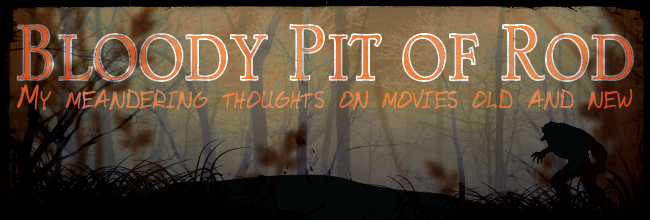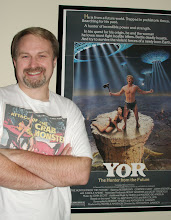When a derelict sailboat drifts into New York harbor, two Harbor Patrol officers
are sent to check it out. Getting no answer to their calls they board the
vessel only to be attacked by a hulking, deformed zombie that kills Cop A while
Cop B blows the critter overboard with a hail of bullets. Assigned by his Gotham newspaper boss to investigate, Brit reporter Peter
West (Zombie
Holocaust's Ian McCulloch) is intrigued by the strange homicide. He links
up with the daughter of the abandoned boat's owner, Ann Bowles (Tisa Farrow,
acting both concerned and dazed). She hasn't heard from daddy in months and his
last letter was from an island in the Antilles
named Matoul. Faster than you can say 'cheesy steel drum music' the two are on
a plane, in the tropics and negotiating with Brian (Al Cliver) and his
girlfriend Susan (Auretta Gay) for a ride on their boat. Terms are agreed upon
and the foursome sets out to find the mysterious Matoul.
Meanwhile, on the island in question, we meet Dr. Menard (a
slumming Richard Johnson), who's dealing with an epidemic of a hideous wasting
disease that's wiping out Matoul's population. A sense of doom hangs over the
place and the natives are convinced it's because of a voodoo curse laid on the
island by an evil witch doctor. Dr. Menard scoffs at this superstitious idea
but knows that something terrible is happening. He's seen the newly dead come
back to life and attack the living with his own eyes, but he's baffled by this
reanimation in which the dead kill and eat the living. While Menard tries to
find a scientific explanation, his beautiful wife Paula (Olga Karlatos) is on
the verge of a nervous breakdown. She wants to leave Matoul but the doctor refuses
so she's turned to pills and booze to cope. With Menard watching over his
patients in the hospital Paula is left alone at home and, in a gruesome and stunning
sequence, zombies attack her. This is the famous moment during which the
woman's eye is punctured by a shaft of wood in extreme close-up. This is a
revolting, horrific gore moment that has lost little power over the years and
still makes me cringe every time I see it.
Back on the boat our crew is having trouble finding Matoul.
In my favorite sequence in the film they take a break so that the lovely Susan
can do a little naked swimming and underwater photography. While scuba diving
around in the sea Susan is first menaced by a shark and then attacked by a
zombie who just seems to be out for a stroll on the ocean floor! She's able to
fend off the zombie and is saved by the shark's natural hatred of the undead.
Yes, these ancient enemies are known for their centuries-old battle for the
title of Most Carnivorous Underwater Monster. We'll have to call this skirmish
a tie since both beasties take a bite out of the other before the film cuts
back to the boat, where we learn that the propeller has been damaged by the
shark. (???)
"Boy, I sure hope that nearby island has someone that can
help us. And maybe it's Matoul!" Sure enough it is, so Dr. Menard and the
shipwrecked foursome make contact at last. The doctor relates the tale of the
island's zombie problem and tells Ann the details of her father's death by the
same disease. The newcomers are skeptical at first, but after a visit to the
doctor's house they accept reality pretty quickly — there they witness several
zombies devouring Paula and are attacked themselves. This forces them to trek
through the countryside on foot to reach the hospital. The survivors gather
there for a Night
of the Living Dead-style zombie siege with guns and Molotov cocktails being
their only hope against a hoard of flesh eating monsters.
Among horror fans there seems to be two ways of thinking
about Lucio Fulci's little gore classic. It's either looked down on or even
hated as a rip-off of Romero's Dawn of the
Dead, or it's worshipped as the first in a long line of bloody,
intestine-draped shockers from Europe that
revolutionized and reshaped the genre. Regardless, the film spawned a glut of
Italian horror movies the like of which the world will never see again and for
some folks that's reason enough to love it. Personally I've never seen the
point of calling this film a rip-off of Romero's classic as they are different
in so many ways. While it's true that only the huge European success of Dawn allowed Zombie to be made, it takes the reanimated-dead-hungry-for-human-flesh
idea and shambles off in another direction completely.
Zombie is one
of my favorite Italian horror movies and it's a effective template for the gore
flicks that followed in its wake: short on logic, long on atmosphere and covered
in blood 'n' guts. After this the European horror film would never be the same
again. Of course this niche burned itself out in a few short years, but it's a
joy to look back at these movies and revel in their madness. Also, at a time
when any hit American film was slavishly copied in the hope of similar
box-office returns it's nice to see the inventiveness on display here. The gore
and violence of Zombie almost squirts off the screen at you as it did in
Fulci's later gore films. These movies are grotesque and disgusting as they
play out like nightmares that have their own twisted logic and rules. Fulci was
a master at establishing an oppressive mood that seeps into every scene, and
while The Beyond was better in this respect, the director's skills are
on glorious display here as well. This is most certainly not a film for
everyone, but for the those who love Zombie there's nothing better.














1 comment:
In my opinion, the worst eyeball violence Fulci filmed was in The New York Ripper.
Post a Comment